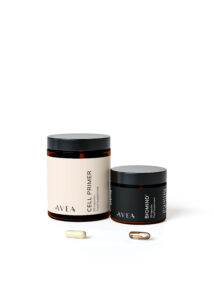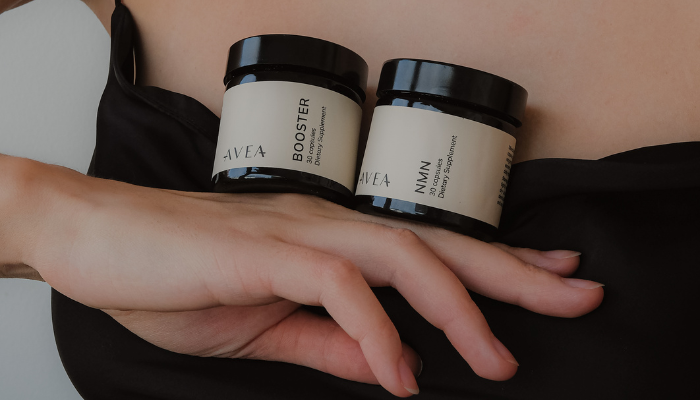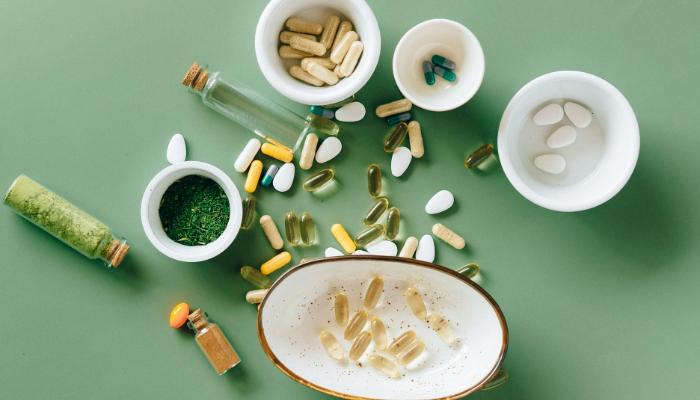Pyrroloquinoline quinone (PQQ) might sound like a mouthful, but this tiny molecule is making big waves in the longevity world.
Discovered in the 1960s as a key player in bacterial energy production, PQQ has since been recognised as a powerful cofactor, helping enzymes do their job more efficiently.
What’s truly exciting, though, is how this once-overlooked compound is now being appreciated for its broader benefits in humans.
Whether you’re interested in ageing gracefully, improving your energy levels, or simply looking for the next big thing in the longevity world, PQQ supplement might just be what you’ve been waiting for.
In this Avea article, we’ll dive into what makes PQQ so special, how it works in the body, and why it’s gaining attention as a must-have supplement for those who want to stay ahead in the health game.

Here are the key highlights about Pyrroloquinoline Quinone (PQQ):
- PQQ helps promote the formation and function of mitochondria, your cell’s energy producers. This is important for healthy ageing, growth, and reproduction.
- PQQ supplements may improve metabolic flexibility, protect the brain, and boost the immune system.
- PQQ helps lower inflammation and oxidative damage, which are linked to heart disease, diabetes, and neurodegenerative conditions.
- PQQ acts like a vitamin. A lack of it in the diet can cause problems, which improve when PQQ is added back.
- PQQ shows promise as a powerful supplement for boosting longevity and preventing chronic diseases.
In this article
Age in reverse with Avea’s FREE guide

- Master the science of rejuvenation.
- Apply proven tips to turn back the clock.
- Transform your health with top longevity specialists.
What is Pyrroloquinoline Quinone (PQQ)?
Discovered in the late 1960s, PQQ was first identified as a crucial helper for certain bacterial enzymes.
As research progressed, it became clear that PQQ belongs to a unique family of molecules called quinoproteins, which play vital roles in human biology as well.
PQQ acts as a tiny powerhouse in your cells, supporting the production of new mitochondria—the engines that drive cellular energy.
It’s also involved in reproduction, growth, and the ageing process [1]. A deficiency in PQQ can lead to various health issues, as it reduces inflammation, protects cells from oxidative stress, and even boosts brain function.
Where is PQQ found in nature?
PQQ, sometimes called methoxatin, is a compound produced by bacteria and found in various fruits and vegetables.
Although not technically a vitamin, PQQ is often referred to as a “longevity vitamin” due to its critical role in supporting growth and stress tolerance in plants and animals.
In bacteria, PQQ helps in breaking down alcohol and sugar to produce energy, whilst in plants and animals, it acts as a growth factor, supporting development and stress management.
Foods rich in PQQ include:
- fermented soybeans (natto)
- green peppers
- kiwi
- parsley
- tea
- papaya
- spinach
- celery
Interestingly, PQQ is also present in breast milk, likely passed from the mother’s diet.
Whilst these foods naturally contain PQQ, the amounts are generally small, making it challenging to achieve the levels associated with significant health benefits solely through diet.
This is why supplementation is often recommended—to ensure you receive an effective dose that support your physical and mental health daily.
PQQ’s chemical structure and function
PQQ’s impact begins with its unique chemical structure as a member of the quinone family. It acts as a REDOX agent, meaning it can switch between oxidised and reduced states, which is essential for managing oxidative stress in the body.
This ability helps protect cells from damage and supports critical processes like energy production and detoxification. PQQ also functions as an enzymatic cofactor, particularly in bacterial enzymes known as dehydrogenases, which are crucial for metabolism.
In humans, PQQ enhances the activity of NAD+-dependent sirtuins, proteins that regulate mitochondrial function, cellular stress responses, and ageing. By boosting these sirtuins, PQQ helps maintain cellular health and resilience over time.
How does PQQ work?
1. PQQ’s role in mitochondrial function and biogenesis
PQQ has a profound impact on mitochondrial health at the cellular level. Mitochondria, the very powerhouses that fuel our existence, are central to energy production and overall vitality.
As we age, the number and efficiency of these vital organelles diminish, leading to a cascade of energy deficits and increased susceptibility to age-related diseases. In fact, mitochondrial dysfunction is recognised as one of the 12 hallmarks of ageing.
PQQ intervenes in this decline by stimulating mitochondriogenesis—the creation of new mitochondria. This rejuvenation of our cellular engines is not merely about sustaining energy, but also about preserving life’s fundamental processes.
It has also been shown to enhance the efficiency of existing mitochondria, optimising their function to ensure that energy production remains robust and consistent. This improvement in mitochondrial performance is crucial, particularly as it directly correlates with our ability to maintain health and vitality over time.
Central to PQQ’s mitochondrial support is its activation of sirtuins, particularly SIRT1 and SIRT3. These proteins are master regulators of cellular energy balance and stress resistance.
By enhancing sirtuin activity, PQQ not only fortifies mitochondrial function, but also maintains a more resilient ageing process, enabling cells to withstand oxidative stress and maintain their integrity over time.
2. PQQ’s impact on cellular signalling and redox balance
Now, PQQ’s influence within your cellular environment extends far beyond its role in mitochondrial health; it is a key modulator of cellular signalling pathways, driven by its unique REDOX capabilities.
As a potent REDOX agent, PQQ has the remarkable ability to oscillate between oxidised and reduced states. This dynamic cycling is crucial for maintaining cellular equilibrium, allowing PQQ to interact with and modulate various signalling pathways that govern essential biological functions.
In a nutshell, PQQ acts like a cellular traffic controller. One of the most significant outcomes of PQQ’s REDOX activity is its potential to exert neuroprotective and anti-inflammatory effects.
By engaging in these electron transfer processes, PQQ can influence pathways that regulate inflammation and neuronal health, helping to protect your brain from degenerative processes and reduce your body’s inflammatory responses.
This makes PQQ a compelling candidate for supporting cognitive health and mitigating the effects of chronic inflammation, conditions that are increasingly prevalent in modern life. Besides, PQQ’s ability to reduce oxidative stress is central to its protective role in the body.
Oxidative stress, caused by an imbalance between free radicals (the bad guys) and antioxidants, is a primary driver of cellular damage and ageing. PQQ combats this by continuously cycling between its oxidised and reduced forms, neutralising free radicals, and preventing the damage they can cause to cells.
This process not only preserves the integrity of cellular structures, but also supports the longevity of cells, reducing the overall burden of oxidative stress on your body.
Experience the power of PQQ with Avea’s Inflammaging Routine

- Boosts mitochondrial function.
- Enhances metabolic flexibility.
- Supports brain health.
- Reduces inflammation.
Our advanced duo harnesses the power of PQQ and other synergistic ingredients to target the root causes of ageing—chronic inflammation and cellular stress.
This potent combination supports mitochondrial health, enhances cognitive and physical well-being, and promotes autophagy.
Together, these ingredients balance your gut microbiome, eliminate senescent cells, and optimise your body’s natural defences for a healthier, more vibrant you.
What is PQQ supplement good for?
1. Improving metabolic flexibility
Scientific findings suggest that PQQ can enhance metabolic flexibility [2], which is your body’s ability to switch between using carbohydrates and fats for energy.
This is crucial for maintaining energy balance, especially during periods of fasting or physical exertion. By improving metabolic flexibility, PQQ may contribute to better energy and weight management, as well as, optimal overall metabolic health.
It is particularly beneficial in conditions like obesity and metabolic dysfunction-associated fatty liver disease (MAFLD), where fat accumulation is a significant concern.
Besides, as PQQ enhances mitochondrial function, it leads to better energy production, which is essential for maintaining a healthy metabolism. It also acts as a powerful antioxidant, reducing oxidative stress—a key contributor to metabolic disorders.
2. Enhancing immune function
PQQ is increasingly recognised for its role in enhancing immune function. As a potent antioxidant, PQQ helps to protect your body from oxidative stress, which can weaken the immune system and make you more susceptible to infections and diseases.
It also reduces inflammation by inhibiting the production of pro-inflammatory chemicals such as TNF-α and IL-6. These chemicals are often elevated during infections or chronic inflammatory conditions, and can lead to tissue damage if not properly regulated.
PQQ also actively supports the immune system by boosting the activity of immune cells, such as CD4+ T cells. These cells are vital for coordinating the immune response and fighting off pathogens.
The best part? PQQ reduces harmful inflammation in immune cells without causing unintended damage. This targeted approach ensures that the immune system remains balanced, preventing overreactions that could lead to autoimmune disorders or chronic inflammation.
Interestingly, PQQ’s anti-inflammatory effects also extend to the brain. By reducing inflammation in neural tissues, PQQ may help protect against neurodegenerative diseases, which are often linked to chronic inflammation in the brain.
3. Providing neuroprotection
PQQ is also gaining recognition for its potential neuroprotective effects, offering significant benefits in maintaining brain health and protecting against neurodegenerative diseases.
As a powerful antioxidant, PQQ helps protect your brain cells from oxidative stress, which is a major contributor to conditions like Parkinson’s disease and Alzheimer’s disease. By restoring mitochondrial function and reducing the production of harmful reactive oxygen species (ROS), PQQ plays a critical role in preventing neuronal damage.
Besides, PQQ actively reduces neuroinflammation by decreasing the release of pro-inflammatory factors such as IL-1β, IL-6, and TNF-α. These inflammatory markers are often elevated in neurodegenerative diseases, leading to further brain damage. PQQ’s ability to promote autophagy in microglia, the brain’s immune cells, helps mitigate this inflammation, thereby protecting your brain.
PQQ also modulates proteins that regulate cell death, such as Bcl-2 and Bax, reducing the loss of neurons in conditions like Parkinson’s disease. This modulation helps preserve your brain cells, supporting long-term cognitive health.
That’s not all. PQQ has also been shown to improve neurobehavioural outcomes in models of stroke and traumatic brain injury (TBI). By reducing brain damage and enhancing recovery, PQQ seems to contribute to better functional and behavioural performance after such injuries.
Long story short, your brain will thrive with a sufficient amount of PQQ, and so will you!
4. Reducing inflammation and oxidative stress
Last, but not least, know that PQQ has potent antioxidant and anti-inflammatory properties. These may play a crucial role in protecting your body against inflammation and oxidative stress—both of which are also major contributors to chronic diseases.
PQQ has been shown to significantly reduce inflammation and oxidative stress in liver and kidney cells. In cases of sepsis-induced acute liver injury, PQQ alleviates inflammation, oxidative stress, and cell death by downregulating CUL3 expression.
Similarly, in kidney cells exposed to high glucose levels, PQQ reduces oxidative stress and inflammation via the Keap1/Nrf2 signalling pathway, a critical pathway for activating your body’s natural antioxidant defences.
PQQ’s protective effects extend to various models, including those of obesity and diabetes. In obese mice, PQQ supplementation reduces liver fat accumulation, oxidative stress, and inflammation—benefits that persist even after stopping supplementation.
Besides, PQQ improves tissue health in models of diabetes and fat graft survival by mitigating oxidative stress and promoting healthy tissue regeneration.
The underlying mechanisms of PQQ’s effects involve the modulation of the Keap1/Nrf2 signalling pathway, which enhances the expression of key antioxidant enzymes like SOD2, CAT, and GPx-3. These enzymes are vital for defending your cells against oxidative damage.
PQQ’s ability to suppress pro-inflammatory mediators, whilst boosting antioxidant enzyme activity, solidifies its role as a robust molecule against oxidative stress and inflammation.
Ibrahim reverses bioage by 6.5 years with Avea

- Uncover how Ibrahim turned back the clock.
- Learn the secrets of cellular health.
- Start your own age-defying routine today.
Is PQQ the same as CoQ10?
No. PQQ is not the same as CoQ10. They both support mitochondrial health, but in distinct ways.
CoQ10 primarily facilitates ATP production by helping electron transport in mitochondria, essential for energy generation.
PQQ, however, not only enhances mitochondrial function, but also promotes the creation of new mitochondria, boosting the cell’s energy capacity.
Both PQQ and CoQ10 reduce oxidative stress, but PQQ acts as a REDOX agent, cycling between states to continuously neutralise free radicals and modulate cellular signalling pathways.
How much PQQ can you take per day?
There is no standardised dosage for PQQ, but studies suggest that doses as low as 5 mg can be effective. Most supplements, however, provide between 20 and 40 mg daily.
It’s essential to adhere to recommended guidelines to avoid potential side effects, such as oxidative imbalances at higher doses. For instance, our Cell Primer in the Inflammaging Routine includes 20 mg of PQQ, a dosage designed to optimise benefits whilst ensuring safety.
If you have underlying health issues or are on medications, consult with a healthcare provider before starting PQQ supplementation.
Can I take PQQ at night?
Whether taking PQQ at night is beneficial depends on its effects on your energy levels and sleep quality.
PQQ is known for enhancing mitochondrial function and supporting energy production, which might lead some to take it in the morning to avoid potential disruptions to sleep.
Still, anecdotal evidence suggests that some users experience improved sleep quality when taking PQQ at night, likely due to its role in reducing oxidative stress and supporting overall cellular health.
Current research does not provide a definitive answer, so it’s advisable to experiment with timing to see what works best for you. For our Inflammaging Routine, we recommend taking it in the morning due to the synergistic effects of the ingredients.
Safety and side effects of PQQ
PQQ is generally considered safe, with short-term studies reporting minimal side effects.
Most users tolerate typical supplement doses of 20–40 mg per day well. However, there is no established dosage recommendation for PQQ due to a lack of robust data.
Higher doses might pose risks, such as oxidative imbalances or potential kidney damage, based on animal studies.
It’s essential to consult with a healthcare provider before starting PQQ supplementation, particularly if you have pre-existing conditions or are taking other medications.
Keynote from Avea
Pyrroloquinoline quinone (PQQ) holds significant promise as a therapeutic nutraceutical, with potential benefits across various aspects of health.
Its roles in enhancing mitochondrial health, providing neuroprotection, and reducing inflammation position it as a valuable supplement for overall well-being.
Whilst the current evidence is encouraging, further research is needed to confirm PQQ’s efficacy and safety in long-term human studies.
As the scientific community continues to explore PQQ’s full potential, it may become an even more integral part in promoting longevity.
References
















